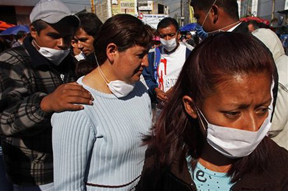How To Avoid The Swine Flu
Posted on April 27, 2009
Filed Under Health, International, United States | Comments Off on How To Avoid The Swine Flu
What is swine flu?
Swine flu is a type of influenza virus which normally affects pigs. But it has ‘crossed over’ to infect humans before, and the current strain of the virus has now affected many people in Mexico. The concern is that it seems to be spreading between people and might cause a wave of infections around the world.
There have been more than 1,600 cases of swine flu in Mexico in recent weeks, and over 100 deaths. But in other countries, where people travelling from Mexico have caught the disease, infections have been milder, and no-one has died. There have been confirmed cases in the US, in Canada and in Spain. Other suspected cases are being investigated in other countries.
What are the symptoms of swine flu?
Symptoms of swine flu are similar to those of normal winter flu. People have a feverish illness, along with one or more of the following symptoms: cough, sore throat, headache, tiredness and muscle aches. Some people also lose their appetite, and some have reported vomiting and diarrhoea.
What should I do if I get symptoms?
If you’ve been to Mexico or the US, or another country that may have been affected by swine flu, the UK’s Health Protection Agency says you should keep an eye on your health for the seven days after your return. If you develop flu-like symptoms during that time, you should stay at home, and contact your GP by telephone, or phone NHS Direct. Make sure you tell them where you’ve been travelling.
You may need tests, which might be carried out at home, or in hospital. Until you have your test results, you should avoid contact with other people. You should also take sensible hygiene precautions to avoid spreading the virus.
- Cover your nose and mouth when coughing or sneezing, use paper tissues and dispose of them straight away.
- Wash your hands frequently with soap and water.
- Wash surfaces like door handles with a normal cleaning product.
It’s important that your children also cover their noses and mouths when coughing or sneezing, and wash their hands frequently.
How can I protect myself against swine flu?
At the time of writing, there have been no confirmed cases of swine flu in the UK. However, it’s possible the virus will spread to the UK. Taking sensible hygiene precautions, such as those listed above, will help avoid spreading or catching the virus. Frequent hand-washing has been shown in clinical studies to prevent the spread of cold and flu viruses.
What treatments work for swine flu?
The anti-viral medicines oseltamivir (Tamiflu) and zanamivir (Relenza) are being used to treat people with swine flu. Testing has shown that the swine flu virus is susceptible to these medicines.
From:
Health Protection Agency. Swine influenza advice for the public. April 2009. Available at the Health Protection Agency (accessed on 27 April 2009).







